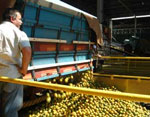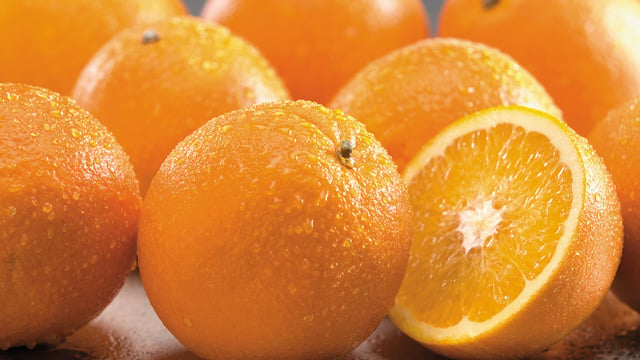Trunçgiller prosesleri
Meyve suyu üretimindeki başarı, bir yandan görünüm, lezzet ve doku ile, diğer yandan sağlık ve güvenlik konuları ile üretim maliyetleri arasında önemli bir denge kurulmasına bağlıdır. Alfa Laval ekipmanları, sistemleri ve hizmetleri özellikle narenciye işleme tesislerinde bu dengenin kurulmasında müşterilerine yardımcı olur.
Portakal işlemede separasyon, konsantrasyon ve pastörizasyon
Eğer portakal suyu üretiyorsanız, farklı tip ve boyutlardaki Alfa Laval santrifüj dekantörleri, ekstraksiyon sonrası pulp almak için ideal olarak kullanılırken, santrifüj separatörler ise klarifikasyon (berraklaştırma ya da parlatma da denebilir) ve cloudy (bulanık meyve suları) ürünlere katılmak üzere pulp geri kazanımı için kullanılır.
Hermetik separasyon
Turunçgillerin işlenerek meyve suyu haline getirilmesi sırasında, önemli miktarda kabuk yağı, meyve suyu içine karışır. Meyve suyunun kalitesini tehlikeye atmadan bu yağ seviyesini azaltmanın en iyi yolu santrifüj ayırmadır. Bu fazlasıyla hassas bir işlemdir, çünkü yağ eser miktardadır.
Alfa Laval Hermetik Separatörleri, hermetik bowl tasarımlarının ürünü en üst hassasiyet seviyesinde işlemeleri sayesinde, kabuk yağını etkili ve güvenilir bir şekilde ayırabilirler.
Portakal ve diğer Narenciye sularının pastörize edilmesi
Sıcaklıklar ayarlanırken, NFC (konsantreden üretilmeyen, ya da sıkma meyve suyu denebilir) meyve sularının ,yüksek oranda posa içeriğine sahip olsa bile, mümkün olan en nazik şekilde işlenmesini sağlamak için de kompakt, termal olarak verimli Alfa Laval ısı eşanjör teknolojisi yaygın olarak kullanılır. Bu Alfa Laval üniteleri meyve suyu içinde bulunan her türlü enzimi devre dışı bırakıp mikrobiyolojik açıdan stabil hale getiren pastörizasyon işleminde de kullanılır.
Aroma ve yağ geri kazanımı
Meyve suyu üretimi ile birlikte portakallardan çok değerli yağ ve aromalar da çıkarılabilir.
Alfa Laval nazik yağ emisyonlarını hassas bir işlem ile temiz, saf kabuk yağı elde etmek için işleyebilen son teknoloji ürünü, güvenilir ve verimli geri kazanım üniteleri sağlamaktadır.
 Oranges
Oranges
Oranges are cultivated in tropical and subtropical regions throughout the world. About 60 million tonnes of oranges are grown annually, accounting for more than two thirds of the world production of all citrus fruit. Of this, about 40% are processed into juice and the rest consumed as whole fruit.
Focus on concentrate
There are normally two focal points in the commercial processing of oranges – the juice itself and the oil extracted from the peel.
The juice is normally processed into concentrate or high-quality NFC (Not From Concentrate) juice, which can usually be sold at a premium. NFC-based juice is currently in considerable demand worldwide, and is the fastest-growing market segment for orange juice.
When the juice is produced as concentrate, equipment such as AlfaVap rising-film evaporators ensures rapid, low-temperature concentration. With the addition of a special aroma recovery unit, this gentle treatment helps make sure you get juice of the best quality.
Separation, concentration and pasteurization of oranges.
Alfa Laval is a world leader in applying advanced centrifugal separation technologies to food and beverage processing.
If you produce orange juice, Foodec decanter centrifuges are ideal for removing pulp after extraction, while different types and sizes of Alfa Laval disc stack centrifuges are widely used in clarification.
Compact, thermally efficient Alfa Laval heat exchanger technology is also widely used to ensure the gentlest possible treatment when adjusting temperatures, and also for pasteurization that deactivates any enzymes present in the juice and makes it microbiologically stable.
Aroma and oil recovery
High-value oil and aromas can also be extracted from oranges side by side with juice processing.
Alfa Laval can also supply you with state-of-the-art oil recovery units that can process delicate oil emulsions into clear, pure peel oil.
Lemons
Lemons are mainly grown for the special culinary properties of the highly acid juice and also for the oil extracted from the peel. This fetches a very high price, and is therefore much in focus when processing lemons.
The many kinds of juice that can be extracted from citrus fruit are normally destined either for domestic consumption or for processing into concentrate or high-quality NFC juice. This is not the case for lemon juice, however, because this juice is too acid to drink.
The juice is normally either concentrated to approx. 48–55 °Bx by evaporation or – less commonly – sold as single-strength juice. This juice can also be used as an ingredient in many other beverages, as it is known for its stable qualities.
Versatile revenue maximization
Regardless of whether you run a single-fruit processing operation or a multi-fruit installation, Alfa Laval systems and equipment can help you achieve quality levels that strengthen your revenues from lemon products.
The oils side
In citrus fruit processing, Alfa Laval is also renowned for equipment that separates oil from the peel. During this process, it is important to safeguard quality via the effective thermal management available from market-leader Alfa Laval equipment.
Hermetic separation
Processing lemons into juice often results in high levels of citrus oil in the juice.
The best way to reduce such oil levels without jeopardizing the quality of the juice is by centrifugation. This is an extremely delicate operation, because the amounts of oil are minute. Alfa Laval hermetic separators are able to remove this oil effectively and reliably due to the ultra-smooth action of the hermetic bowl.

